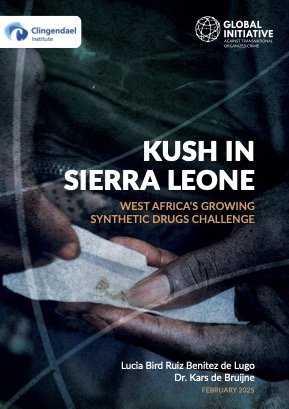By Lucia Bird Ruiz Benitez de Lugo and Kars de Bruijne
Since 2022, a synthetic drug known as ‘kush’, has killed likely thousands of people in West Africa. Kush emerged in Sierra Leone, but quickly spread across countries in the subregion, including Liberia, Guinea, the Gambia, Guinea-Bissau and Senegal, with devastating effects. By April 2024, the health impacts of kush, a synthetic drug containing nitazenes, opioids as – or more – powerful than fentanyl, as well as synthetic cannabinoids, were so acute that the presidents of Sierra Leone and Liberia had declared national emergencies over drug use – an unprecedented step.
This drug represents a turning point in West Africa’s drug landscape. The scale of its market expansion and its lethal public health effects are unparalleled. Yet, amidst widespread speculation about kush, a number of critical questions remained unanswered about the drug. What is kush? Where does it come from? Who is producing and trafficking it? And what can be done to reduce the harm posed by this drug?
This research confirms that kush is composed of potent synthetic opioids called nitazenes, some of which are 25 times stronger than fentanyl, and synthetic cannabinoids commonly found in European drug markets. The consequences have been dire, with mass fatalities overwhelming mortuary systems, forcing emergency group cremations, and leading to bodies being abandoned in the streets.
The research identifies China, the Netherlands, and most likely the UK as key sources of kush and it’s active ingredients, which are trafficked via maritime routes and postal courier services. It is unclear if the kush ingredients exported from European countries include nitazenes, or only synthetic cannabinoids. Initially controlled by a few organized criminal groups, the kush market has since fragmented, making it even more difficult to counteract. Local synthesis of the drug has increased, escalating health risks, and Sierra Leone’s street gangs for a key part of the drug’s distribution network.
Some key points highlighted in the report are:
Kush is a drug that has killed likely thousands of people in West Africa, with Sierra Leone as its epicentre;
Chemical testing finds that nearly 50% of samples contain nitazenes, a very addictive and deadly synthetic opioid comparable to fentanyl (the other half contains synthetic cannabinoids)
Some of these substances are imported from China, the Netherlands and most likely the United Kingdom through maritime routes, the air and postal courier services (It is unclear if the kush ingredients exported from European countries include nitazenes, or only synthetic cannabinoids);
The market for kush used to be more strongly controlled by large groups but increasingly fragmented, with smaller actors setting up own operations
Urgent coordinated action is needed on three fronts; a) better monitoring, early warning, testing, and information-sharing in West Africa; b) disrupting supply chains by China, the Netherlands and the UK and at Sierra Leonean points of entry; c) a strong push on mitigating the harms of kush consumption
Clingendael: 2025. 60p







